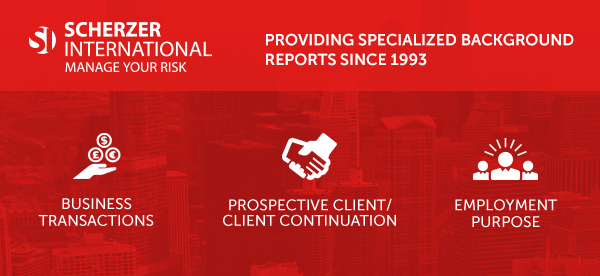The Scherzer Deal Report: September 11-18, 2020
Here is this week’s Deal Report for private equity and venture capital activity for US-based PE and VC firms and portfolio companies, brought to you by Scherzer International.
|
|
|
Here is this week’s Deal Report for private equity and venture capital activity for US-based PE and VC firms and portfolio companies, brought to you by Scherzer International.
|
|
|
It is a standard practice for employers to run background checks on potential new hires. Such checks help employers protect their company by learning about the trustworthiness of the candidate through their financial, criminal, and driving records and education and employment verifications. But the pandemic has affected the operations of many institutions worldwide. From court closures to remote college campuses, it may be more difficult for the screening provider to check a criminal record or verify an educational background. Nonetheless, the possibility of delay should not cause employers to lower the standards of their screening policies.
The most important reason why an employer should not temporarily waive certain parts of a background check is because it may make it harder to justify its necessity in the future. For example, say a court is closed and is unable to provide information on candidates’ criminal history. Because of this, an employer who is anxious to add the new hire to the frontline chooses to waive the criminal check requirement. Well, when a court begins to provide legal information again and an employer decides to reinstate the criminal check requirement, the employer could face compliance issues.
Under current anti-discrimination laws, namely Title VII of the Civil Rights Act of 1964, employers must demonstrate that its hiring practices are “job related” and “consistent with business necessity.” But if an employer chooses to forgo the criminal checks during the pandemic and wishes to reinstate them later, they may be violating this law. Since the criminal check was once suspended, one could argue that the practice was not job related or that it was not a business necessity. Furthermore, streamlining the employment screening process by waiving certain aspects could lead an employer to overlook valuable insight into a candidate’s character. Therefore, while a shorter background check program during the pandemic could bring short-term benefits, it runs significant long-term risks.
So, what are your options?
We have outlined up two possible avenues available to employers during these times.
Hire now (but reserve the right to run future background checks)
If a company is in a position in which new hires are urgently needed, they may hire the candidates based on the information available to them at the time of the background check and reserve the right to conduct additional background checks post-hire, once information providers resume to normal operations. But if an employer takes this route, they must clearly communicate with both their background check provider and the new hire.
They should work with the background check provider to take note of those candidates whose checks are not yet completed so that the provider can easily revisit the report in the future. Employers should also make it clear in an employee’s offer letter that the offer of employment is contingent upon the successful completion of a background check that may occur at a later date.
Delay the hire
For employers who are required by law to complete background checks prior to a new hire’s start date, they may have to delay the worker’s start date. But whether a background check provider can access the required information for an employment screen depends on the location of the various sources of information, from the courthouses to the educational institutions.
All in all, although background checks may take longer during the pandemic, they are, especially now, critical to manage your risk. With the rising number of job seekers and the remote workforce, companies must do what they can to ensure that they are hiring qualified professionals who will be valuable additions to the company.
Here is this week’s Deal Report for private equity and venture capital activity for US-based PE and VC firms and portfolio companies, brought to you by Scherzer International.
|
|
|
Here is this week’s Deal Report for private equity and venture capital activity for US-based PE and VC firms and portfolio companies, brought to you by Scherzer International.
|
|
|
Here is this week’s Deal Report for private equity and venture capital activity for US-based PE and VC firms and portfolio companies, brought to you by Scherzer International.
|
|
|
An important and unexpected ruling was handed down by the Court of Justice of the European Union (CJEU) on July 16, 2020, in Data Protection Commissioner v Facebook Ireland Ltd and Maximillian Schrems (“Schrems II”) that invalidates the EU-U.S. Privacy Shield (“Privacy Shield”) arrangement. Since 2016, the Privacy Shield provided U.S. companies with a mechanism to comply with the General Data Protection Regulation (GDPR) requirements when transferring personal data from the European Union to the U.S.
What this means
Now companies that subscribed to the Privacy Shield must find another GDPR-compliant solution for the transfer of data. The European Data Protection Board indicated in its July 23, 2020 FAQs that it will not be providing a grace period as the authorities had done for the EU-U.S. Safe Harbor (“Safe Harbor”) framework following the “Schrems I” decision.
Notably, the CJEU’s decision expressly stated that the standard contractual clauses (SCCs) previously promulgated by the European Commission (EC) are still a valid tool for data transfers from the EU to the United States. The SCCs are sets of contractual terms and conditions that the controller and the processor of the data both execute to comply with GDPR’s requirements. However, the CJEU’s decision does not give blanket approval to the SCCs–the decision acknowledged that future challenges to SCCs are permissible by the local data enforcement agency for any EU-member state. For example, an EU-member state might prohibit or suspend exports of personal data from its country under SCCs, if the member state concludes that the SCCs are not or cannot be complied with in the recipient third country (such as the U.S.) because of the member state’s local legal requirements.
The CJEU did not directly reference binding corporate rules (‘BCRs’) which are used for intragroup data transfers and require prior approval of the competent data protection authority. For now, this means that BCRs remain a valid transfer mechanism under the GDPR as BCRs are of a similar nature to SCCs (both are considered an “appropriate safeguard” pursuant to Article 46 GDPR).
For some situations, an alternative is to look to the narrow derogations under Article 49 of the GDPR, such as to perform a contract or base the transfer on the subject’s explicit consent.
What happens next
When the adequacy of the Safe Harbor was invalidated by the CJEU in 2015, the U.S. Department of Commerce (DOC) and the EC had already been negotiating for an updated trans-Atlantic program for many months. With Schrems II, and although the DOC and EC have indicated that lines of communication are open, the discussions are not nearly as advanced. And the issues cited by the CJEU in Schrems II may require some form of legislative and not merely an administrative action to address. As such, the process to revamp the Privacy Shield is unlikely to be concluded any time soon.
The DOC, in a press release in response to the CJEU’s decision, and later in its updated Privacy Shield FAQs, stated that it will continue to administer the Privacy Shield program, including processing submissions for self-certification and re-certification and maintaining the participants’ list. The DOC emphasized that the CJEU’s decision “does not relieve participating organizations of their Privacy Shield obligations.”
The UK’s Data Enforcement Agency also issued a statement advising companies to continue using the Privacy Shield until new guidance becomes available but added that companies “do not start using the Privacy Shield during this period.”
Stay tuned for more regulatory guidance and other developments in the next few weeks.
Disclaimer: This is not legal advice. The resources and information provided here are for educational purposes only. Consult your own counsel if you have legal questions related to your specific practices and compliance with applicable laws.
Here is this week’s Deal Report for private equity and venture capital activity for US-based PE and VC firms and portfolio companies, brought to you by Scherzer International.
|
|
|

Executive Vice President
Scherzer International
Direct: 818.227.2598
Mobile: 818.337.9513
JStaheli@scherzer.co

Link to the article: https://labusinessjournal.com/news/2020/jun/29/leaders-influence-private-equity-advisors-jessica-/

Here is this week’s Deal Report for private equity and venture capital activity for US-based PE and VC firms and portfolio companies, brought to you by Scherzer International.
The Scherzer Deal Report is released on Tuesdays.
|
|
|
Here is this week’s Deal Report for private equity and venture capital activity for US-based PE and VC firms and portfolio companies, brought to you by Scherzer International.
The Scherzer Deal Report is released on Tuesdays.
|
|
|